We tend to think of authoritarianism in terms of how it affects society as a whole or of how it affects individuals. I wonder, though, if we might adjust our microscopes and examine how a dystopian world either comments on or impacts family life. Are there elements in some of our favorite reads that address the relationships in households? I think there are, and I offer a few comments on parenting, marriage, and sibling love. 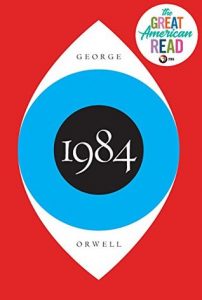
1984
Fear Your Children
Growing up in the Jurassic Period, there was one golden rule: your folks run your life, not the other way around. For me, a particularly horrifying aspect of 1984 is the power young children have. With a word, they can send their parents off to that oh-so-menacing Ministry of Love. They listen at keyholes and peek through cracks in doors. They’ve perfected the art of spying like career undercover agents. And what are they? Little kids. Little enough to pick up and fireman-carry off to their rooms for a bit of time-out.
Living in fear of one’s own children might take the fear-inducing prize in Orwell’s classic novel—but then again, there are those rats to consider.

Fahrenheit 451
A Match Made in Hell
You work hard all day, setting books on fire, waving your portable blowtorch around at anything that might be read, and when you come home, all you want is a little hug. Forget it, brother. Your wife is permanently glued to the largest boob-tube ever invented: the parlor wall, so stuck on it that she can barely remember your name. You start having second thoughts about your chosen trade, you want someone to talk to, and you turn to that one person who’s supposed to be your life partner, your sounding board in all things intimate. She tunes you out. You try reading a book, just for fun, and end up being locked out of the bathroom while your wife swallows enough pills to bring down a bull elephant.
Ah, marriage.
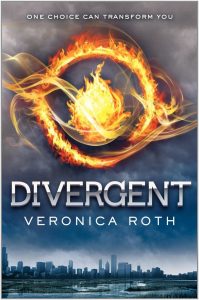
Divergent
When ‘Goodbye’ Is Really ‘Goodbye’
Where I come from, young adults leave the nest. They go off to college, they meet a girl or a boy, they settle down. Usually, though, the goodbye isn’t forever, even if they choose not to follow in Dad’s footsteps and take over the family mortuary business. Not so in Veronica Roth’s faction-separated society. Here, your choices are forever. Take a test, drop some blood into the vessel that holds the most appeal, and it’s bye-bye family and childhood friends. Of course, you do have other options. You can stay exactly where you are—and then be bitter about it for the rest of your life. Sort of a lose-lose situation, no?
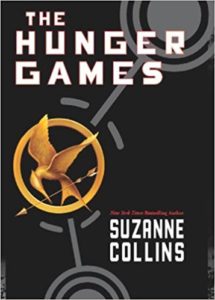
The Hunger Games
Do You Love Your Little Sister This Much?
Not long ago, I read a beat-sheet analysis of The Hunger Games. Part of the discussion revolved around one question: Where is the debate? In other words, why don’t we have several pages or chapters of Katniss weighing the pros and cons, wondering how she might react when Prim’s name is picked from the fishbowl? The answer is easy: there’s no time. When your kid sister is one second away from being railroaded off to a mini-gladiator contest, you don’t stop to work up a flowchart to help with the decision process. You just don’t. You step in, you offer yourself in her place, and that’s it. Naturally, this does require loving your younger sibling. (Note to little sisters everywhere: if your big sis takes the time to debate, you might want to rethink that relationship.)
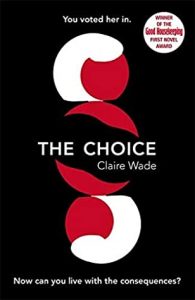
The Choice
Baking Day With the Kids (Not!)
I was fortunate to get an early copy of Claire Wade’s The Choice, just out from Orion at the end of 2019. When I wrote the blurb, I called it “Big Brother meets Betty Crocker,” so that might give you a hint as to what the book is about: a terrifying nanny-state that oversees your health and nutrition. Sugar? Banned. Butter? Rationed to a micro-pat each week. Cookies, cakes, and pies? These words no longer exist.
Imagine having a family baking party and being reduced to cooking up an inedible lump of sludge that no one wants to eat. Imagine doing it if your former career was a—you guessed it—baker. I’m still having nightmares about this one. 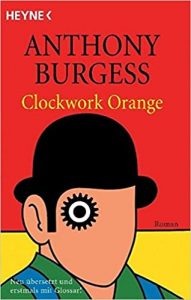
A Clockwork Orange
Winner of the Lousy Parenting Award
Alex and his ‘droogs’ might be the poster children for bringing back corporal punishment. I mean, these guys are unparalleled jerks. I can only imagine what my own parents might have done with me if I carried out the kind of antics 16-year-old Alex does in Burgess’ novel. Likely, I’d still be under house arrest thirty-some years later.
One of the many clever elements of A Clockwork Orange is its ability to evoke a reader’s sympathy for a teenager who deserves a good spanking. Maybe more than that. It’s hard to lay all the blame on a monster whose mother and father can’t be bothered to make him toe the line. The apple doesn’t fall far from the tree, they say.

VOX
Bedtime Stories? Nope.
If you’ve read my novel about a world where women and girls are allowed only one hundred words per day, you’ll understand the terrible predicament Jean McClellan and her family find themselves in. From stilted dinner table conversations to the lack of bedtime stories, the draconian restrictions placed on females affect everyone in the household. Siblings are forced to amend their conversational habits; parents are in the horrible situation of having to train their young daughters to avoid speaking. Result? Total destruction of the social fiber.

















